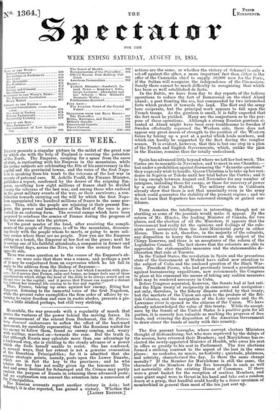From America the intelligence is interesting, though not so startling
as some of the journals would make it appear. By the return of Mr. Hincks, the leading Minister of Canada, for two places, and the election of all the Ministers, it appears that the Government had really hit the opinions and feelings of the colo- nists more accurately than the Anti-Ministerial party in either House. There is not, therefore, in the majority of the colonists, any disposition to hurry the Government on the subject of the Clergy Reserves, and there is an acceptance of the reform of the Legislative Council. The fact shows that the colonists are able to appreciate the statesmanlike measures and the statesmanlike de- liberation that rule at Toronto.
In the United States, the revolution in Spain and the precarious state of the Government at Madrid have called new attention to the subject of Cuba and the unclosed question of the Black War- rior. President Pierce, who had previously issued a proclamation against buccaneering expeditions, now recommends the Congress to place at his command the means of taking any sudden measures that may be rendered necessary in Cuba. Before Congress separated, however, the Senate had at last rati- fied the Elgin treaty of reciprocity in commerce and navigation : not only, therefore, is the fishery dispute settled by that treaty, but the markets of the Union are open to the produce of the Bri- tish Colonies, and the navigation of the Lake canals and the St. Lawrence river is opened to the citizens of the Union. We have already acknowledged the value of this treaty. While-its accept- ance by the Senate of the United States is a positive gain for all parties, it is scarcely less valuable as marking the progress of free trade, and evincing the disposition of the American Government to draw closer the bands of amity with this country.


























